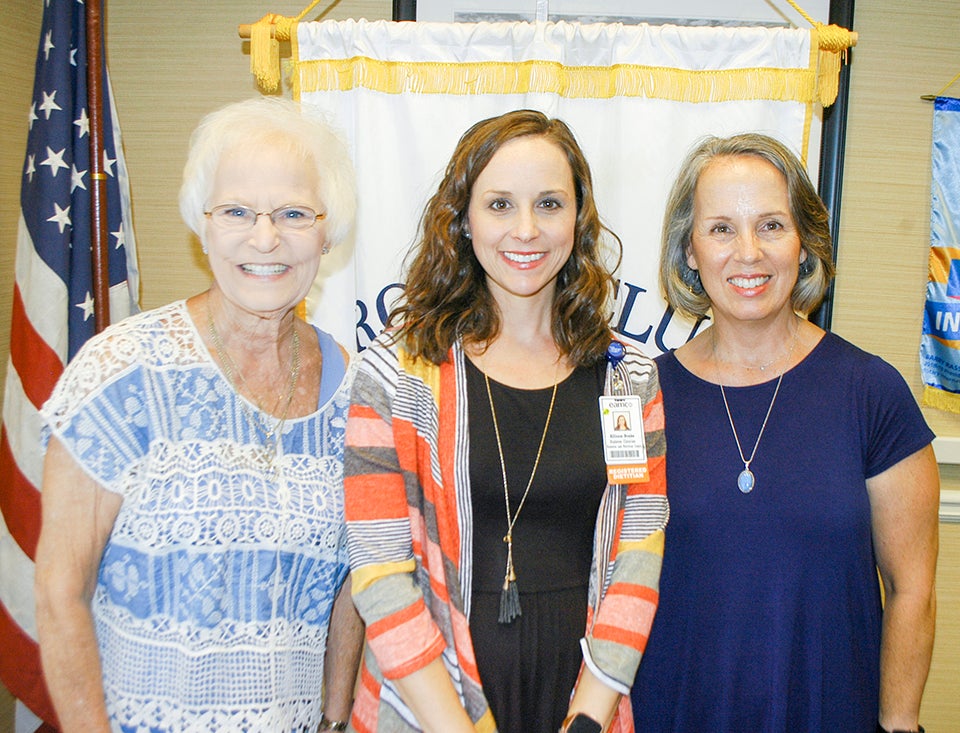EAMC-Lanier educates Rotary on diabetes
Published 4:22 pm Thursday, June 13, 2019

- EAMC diabetes educators Allison Drake (at center) and Tammy Hollis (at right) were guest speakers at Thursday’s noon hour meeting of the West Point Rotary Club. At left is Carolyn Lott, the program chair.
LANETT —Americans may be on the verge of a healthcare crisis, and those who live in the Deep South may be especially hard hit. The threat being posed is something that’s been with us for a long time — diabetes.
It’s not necessarily a death sentence, but when someone has diabetes they will have to medicate it for the rest of their life. In some cases, it can cost $2,000 to $3,000 a month to do that.
Two diabetes educators from the East Alabama Medical Center and EAMC-Lanier talked about diabetes at Thursday’s meeting of the West Point Rotary Club. Allison Drake, a registered dietician and coordinator of EAMC’s diabetes prevention program, and Tammy Hollis, a lifestyle coach, discussed what can be done for those who have been diagnosed with pre-diabetes.
This occurs when one’s blood sugar is elevated but not high enough to have diabetes.
A staggered number of 84 million Americans are affected. They are not yet doomed to be diabetics but without significant lifestyle changes are well on their way to having diabetes.
If a large percentage of this 84 million people are diagnosed with diabetes in the near future, it could spell big trouble for the U.S. healthcare system.
“Once you have diabetes, it’s a chronic disease you have and will always have to manage,” Drake said. “Ninety percent of those who have pre-diabetes don’t know they have it. If you are overweight and not very active you are at high risk for it, and our culture to a large degree is not very active. If we don’t make major lifestyle changes, we are in big trouble.”
Those who have pre-diabetes can reverse it, Drake said, “but when you have diabetes you are stuck with it.”
“The good news is that you can manage your risk for type 2 diabetes,” Drake said. “Small steps make a big difference in helping you live a longer, healthier life.”
EAMC’s Diabetes and Nutrition Center will be having some information sessions at Valley Community Center for anyone who would like to know more. The sessions will be taking place at 10 a.m. EDT on Tuesday, June 18 and at 10 a.m. on Tuesday, June 25.
These sessions will encourage participants to lose weight, eat healthier, move more and to reduce stress.
Drake and Hollis work with Brooke Lumpkin, EAMC-Lanier dietician and diabetes specialist, in educating the public about pre-diabetes and diabetes.
“We have services across the board,” Hollis said. “We are hoping for good turnouts at our upcoming sessions at the Community Center.”
A Valley native, Hollis is retired from Auburn University after a 30-year career in promoting health and wellness.
“I am glad to be back home and excited about this program,” she said. “What we are doing means a lot to me.
Having diabetes or pre-diabetes is something you can’t determine for yourself, so Drake and Hollis recommended talking to your doctor.
Type 2 diabetes is more common in African Americans, Latinos, Native Americans, Asian Americans, Native Hawaiians and Pacific Islanders.
It’s also more common among those who are overweight. This puts Deep South states in the danger zone. Obesity is more common in this part of the country than it is in other parts of the U.S.
Age is also a factor in having diabetes.
“The older you are, the greater the risk you are not only for diabetes but for any chronic illness,” Drake said.




